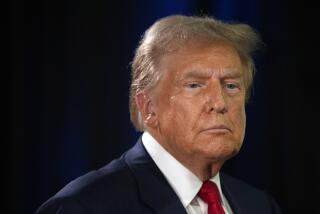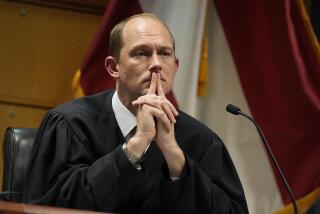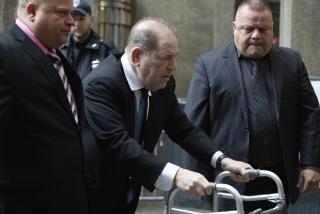Judge Throws Out 13 More Counts Against Keating
- Share via
A Superior Court judge Friday threw out 13 more criminal counts in a state securities fraud indictment against former thrift owner Charles H. Keating Jr. and three others and gave the defendants another chance to argue for the dismissal of the remaining 21 counts.
Judge Lance A. Ito in Los Angeles also rejected the prosecution’s theory of the case, which would have held Keating accountable criminally for the actions of employees without his knowledge. And, he said, prosecutors came close to losing the entire case because of misconduct before the state grand jury.
Ito left intact, for now, the heart of the prosecution’s case--that small investors were duped into buying risky bonds that they thought were safe.
But his decision forces the Los Angeles County district attorney’s office to revamp its trial strategy to show that Keating and the others “willfully” caused false and misleading statements to be made about securities sold at Lincoln’s Southern California branches.
“I’m pleased. I’m pleased with life. I’m very pleased with my lawyers,” said Keating, who refused to comment further.
Keating was chairman of American Continental Corp. in Phoenix, which owned Irvine-based Lincoln. He has become the leading symbol of thrift industry excesses, despite his outspoken criticism of S&L; regulators.
The company declared bankruptcy in April, 1989, and regulators seized Lincoln the next day. Both are being liquidated, and regulators estimate that Lincoln’s losses will cost taxpayers $2.7 billion, making it the biggest failure to date.
Keating, former American Continental President Judy J. Wischer and two former Lincoln presidents, Robin S. Symes and Ray C. Fidel, are accused in 20 counts of making false and misleading statements about American Continental bonds that were sold mostly to Lincoln customers. They were also charged on 14 counts of selling those bonds without state authority.
e Ito decided that, in the case of the latter counts, the law was not technically broken because American Continental had authority to sell the bonds and exceeding that authority did not invalidate that authority. He dismissed 13 of the 14 counts. The remaining count covers a period during which authority to sell bonds lapsed.
Ito was also displeased with a prosecutor’s conduct before the grand jury.
“The prosecution’s theory was at the very fringe of what’s permissible under law,” Ito said. One prosecutor may have gone too far in telling jurors that “all they (the defendants) had to be was corporate officers and they were liable for wrongdoing.”
Another prosecutor, the judge said, corrected the actions through his jury instructions.
Ito’s ruling was not totally unexpected.
When he threw out 14 other counts in January, he questioned whether much of the remaining ones would survive defense attacks on grounds that the grand jury didn’t have “probable or reasonable” grounds to bring the charges.
He also expressed doubts that the prosecution’s theory of the case could survive. Under that theory, prosecutors had hoped to hold the Keating group criminally accountable for the actions of employees, a principle called vicarious liability.
Prosecutors also wanted them held accountable without a showing of fault and regardless of whether the employees believed what they told customers. That principle is known as strict liability.
But Ito said criminal defendants can’t be exposed to significant prison time for convictions based on vicarious and strict liability. He said prosecutors will have to show some knowledge on the part of the Keating group.
Ito set June 28 for a hearing for arguing dismissal of the remaining charges. Trial is set for Aug. 2.
More to Read
Inside the business of entertainment
The Wide Shot brings you news, analysis and insights on everything from streaming wars to production — and what it all means for the future.
You may occasionally receive promotional content from the Los Angeles Times.










